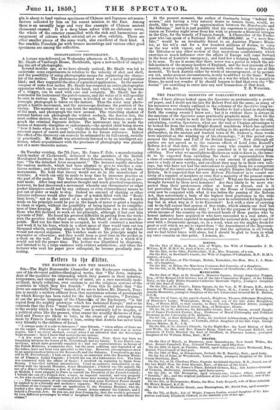THE PRACTICAL BENEFITS OF PARLIAMENTARY REFORM.
Sin—I have always looked upon the Spectator as preeminently a practi- cal paper, and I doubt not the late Sir Robert Peel did the same, as many of his measures were clearly outlined in the columns of the Spectator long be- fore they were acknowledged by him. Whether he had a hand in shadowing forth the coming events I know not ; but it is evident there is always in the sanctum of the Spectator some practically prophetic mind. Now for the nonce I think it would be well for the writing Spectator to inform the cold, calculating, reading Spectators, what are the real or Utopian advantages to be looked for from the recent Bright-Russell maelstrom which has agitated the empire. In 1832, on a chronological railing in the garden of an eminent philosopher, in the ancient and learned town of St. Andrew's, these words were inscribed as the winding up of his chronology, "At this period com- menced the Decline and Fall of the British Empire." Now although all parties are not agreed as to the ruinous effects of Lord John Russell's Reform Act of that date, still there are ninny who consider that a 'good shoe is not improved by the awl holes punched in it by an everlasting cobbling. Now what we unenlightenedjlookere on wish to know is, the bene- fit to be expected from extending the choice of representatives from a class of constituents embracing already a vast amount of political ignor- ance to a body of men worthy, and excellent they may be in their own call- ings, but who have not had the antecedents to qualify them for a competent knowledge of the intricacies of governing a mighty Empire like that of Great Britain. Is it expected that the new Reform Parliament is to consist en- tirely of a number of members or even that a majority of the present repre- sentatives will be displaced, and if so, cui boni ? What are the measures to be brought forward by, these nevi homines ? Are they likely to be more res- pected than their predecessors either at home or abroad, and is it not proverbial that the tone of feeling in the House of Commons cannot even now be compared with what it was before the passing of the Reform Act, then notoriously a body of the highest bred gentlemen in the wide world. Departmentaf talent, however, may now be substituted for high breed- ing but in what way is it to be Exercised ? Is it with a view of carrying opt to its full extent that system of free trade, which admits our food but not our clothing for a nominal duty ? Is it for the purpose of throwing the whole income of the country on the devoted heads of those parties who by honest industry have acquired or who have succeeded to a real estate, or are the new members expected to repudiate the national debt, wipe it out for ever with a Democratic sponge, or, in a word, what are the might y deeds for good or evil which we are to expect from "the Amendment of the Represen- tation of the people ? " My own notion is that the agitation is all forced, and we had better leave well alone, but I should be glad to learn in what my error consists on this point. I remain, &c. R. S. J.


























 Previous page
Previous page